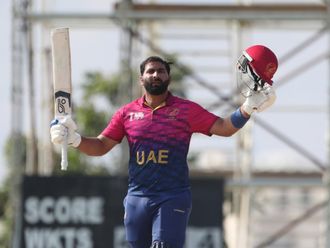Dubai: Mohammad Juma Bu Amim, the vice-chairman and CEO of golf in DUBAi (giD), owners of Desert Classic is one of the few persons who have watched the evolution of the Emirates Golf Club from the best ringside seat possible. The growth of the club as well as the Classic had almost gone hand in hand and and few will dispute the role of the first European golf Tour event in the region in shaping the iconic stature of the EGC, which is celebrating it’s silver jubilee this year.
Not only was he the first Emirati general manager of the club, he had been an amateur golfer who had honed his skills on the course here and can rightfully call the Majlis course his second ‘home’ - with his spacious, sunlit office sitting right near it’s first hole and the pavillion. Bu Amim took time out before leaving for the Mena Tour to speak to Gulf News about the club’s 25th anniversary and the role it played in the development of Dubai as a golfing destination.
Following are the excerpts:
GULF NEWS: As a partner to this journey of Emirates Golf Club, how does it feel on the EGC reaching the landmark of 25 years?
MOHAMMAD JUMA BU AMIM: There is a great sense of pride all around and the landmark is the manifestation of the vision of His Highness Shaikh Mohammad Bin Rashid Al Maktoum, Vice President and Prime Minister of the UAE and Ruler of Dubai, coming to fruition.
His Highness took a decision to set up the Emirates Golf Club when golf was a virtually an unknown commodity here, and today it is called the home of golf in the region. You couldn’t have asked for more. Obviously, I feel honoured and privileged to be part of the eventful journey for good seven years as General Manager of the club.
The club was once located on the outskirts of the city, now the city seems to be developing around it. How do you react to the changing landscape around you?
I think staging of the Omega Dubai Desert Classic just one year after the construction of Emirates Golf Club was the catalyst to the changing landscape of the city today. The tournament did an excellent job in promoting the city - and indeed the club itself. Real Estate developers were smart and cashed in on the popularity of the event to build a whole new city around the club, something that contributed to the phenomenal real estate growth in Dubai. They knew people who buy into golf developments aren’t necessarily golfers. It’s the lifestyle they are interested in, and they are prepared to pay premium rates for it.
As the first Emirati general manager of the EGC, what kind of challenges you faced in the early days?
Nothing at all. Being a social golfer myself and a member of the Dubai Creek Club, I was pretty familiar with the game and the golfing circle. All thanks to my staff members who went above and beyond to make me happy and comfortable throughout my tenure there. Of course there were challenges being a GM of the club on running the affairs of the club, but it had nothing to do with me being an Emirati.
How much do you think the EGC has contributed in making Dubai the golf destination in the Middle East?
The club was fondly referred to as a ‘Desert Miracle’ when it was built in 1988 - and it indeed turned out that way. It led to the birth of the Omega Dubai Desert Classic in 1989 which, in my view, is a most significant development in the global expansion of world golf. It changed the face of the European Tour. The tournament was the European Tour’s first venture outside Europe and today in European Tour, we have close to 50 events in 29 destinations.
What really impress me is to see the influx of Tour players using the club as a genuine season warm-up destination and that speaks volumes of the country’s exceptional golf facilities, infrastructure and unbeatable winter climate.
Finally, how do you react to the fact that golf has still remained an ex-pat sport here rather than the Emiratis warming up to it?
I think it will remain the case if you look at the UAE population statistics. The UAE had 7.2 million people at the end of 2011, with expats accounting for around 88.5 per cent of the country’s total population. Under the circumstances, if we have 150 to 200 Emiratis playing golf it’s not bad figure at all considering the fact that football here remains the number one sport.
Definitely, we need an effective junior development programmes if we are to introduce more Emiratis to golf.








